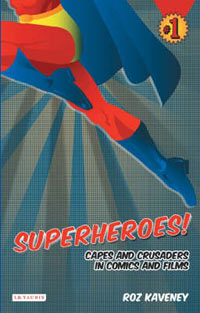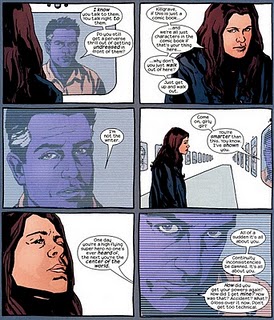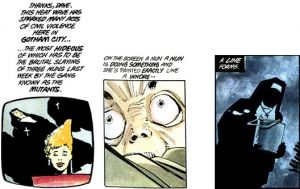Superheroes!: Capes and Costumes in Comics and Film
By Zak Edwards
August 21, 2010 - 14:19
I.B Tauris
Writer(s): Roz Kaveney
ISBN: 978-1845115692
$20.95 CDN, 288 pgs.
Roz Kaveney, a fairly well known popular culture commentator, recently devoted her efforts to the superhero genre of comics and film in her book Superheroes!: Capes and Costumes in Comics and Film, which offers a variety of meditations on the superhero genre of mostly the past thirty years. The book is, in her own words, a fairly "theory-lite" but still fairly academic analysis of the genre, but not without many of the problems that come about, both with the academic pursuit of graphic literature, especially in the superhero genre, but also in the addressing of a more general audience, which may cause her arguments to become both less well-crafted, but also more simplistic.
 |
Superheroes! has problems finding and speaking to an audience, choosing a large demographic with material which leads to many issues of what is being said, what is being glossed over, and what is being proven. Kaveney largely chooses, in many places (even in her exercises of close readings), to display an almost encyclopedic knowledge of comic books of the past thirty years and a little further beyond while maintaining an attitude of mostly mockery of people who hold value to such knowledge. Comic book readers have generally had the problem of amassing pointless facts in order to point out flaws and win matches of general knowledge, but Kaveney has largely displayed this almost to prove her worth on the subject, mostly leading to generalizations about material and arguing contexts known only to a select few. Similarly, Kaveney argues quickly about subjects known only to a select few from an academic perspective, leading to possibly an even more frustrating quick dump of information before moving onto another subject. Her close readings, which makes up the majority of the book, suffer from this sort of summarizing while avoiding fully developed arguments to seemingly keep the audience a larger demographic. Phrases like “this isn’t as Jungian as it sounds” frequently occur before the switching of topics, hiding entire papers in between sentences. The result, unfortunately, is the everyone is no one principle and everyone is left wanting more.
 |
| Kaveney is particularly interested in the relationship Jessica Jones has with the Purple Man and how her past is explored through an already created history. |
 |
| One of Kaveney's more interesting analyses is the relationship between media, the public, and the creation and sustaining of the superhero, both as a public and vigilante figure. |
Superheroes! eventually falls apart by the end; her analyses of Joss Whedon, both his television and comics work, are nothing to be astounded by and mostly rely on already discussed comparisons between Whedon’s admitted influences and his own work. The chapter is ultimately a fruitless exercise considering the work accomplished in previous chapters and almost seems to work as filler given her previous books and papers written on Buffy the Vampire Slayer. Similarly, the final chapter on the comics-to-film industry really never draw any conclusions which argue anything at all, leaving the last two chapters of the book to really only have a brief skimming over. Kaveney also has a tendency to have her interpretations and analyses lead to both extreme points, with phrases like ‘the best book of...’ or ‘worst example of...’ frequently popping up, and the valuation of the texts based on her interpretations. The strength of Kaveney’s book ends up mostly in the first few chapters, reading certain particular sentences which hint at a deeper argument left untouched. The conclusions are ultimately up to the reader to work through the arguments which are left untouched and almost hidden. Superheroes! is a great book in theory (lite), but is too wrapped up in its apparent illegitimacy and unfinished good ideas to be fully effective. Kaveney treads a line between literary interpretation (academic) and historical recording (popular) without fully satisfying either. Worth the read, but one is left waiting for the day when a book of the scholarly consideration of superheroics is done without apology or excuse.
Related Articles:
Response to Superheroes Are Kinda Gay
Comics/Culture #5: Superheroes vs. #HeForShe
Dead Superheroes: Still A Good Plot Device?
Another Side to Me? - Superheroes' Secret Identities
Stan Lee's How to Draw Superheroes book review
The Binquirer, July 25 Edition: Grant Morrison quits superheroes, Chik-fil-A fails to spin Henson Co announcement, Christian Bale visits Aurora, and much more!
Legion of Superheroes # 4
Lazy Teenage Superheroes - Short Film
Preview: The Simon & Kirby Superheroes
Superheroes!: Capes and Costumes in Comics and Film
